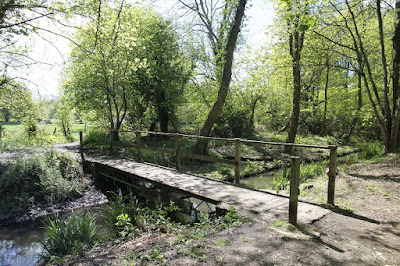I happened to be in the village one Saturday at a small dog show with my wife the intention for me was to find some WWII pillboxes which according to my map were in the vicinity. So leaving my wife at a dog show we were at I had a look around then after walking through the countryside then after coming across this cottage
I passed this row of cottages which I think are called Gunpowder Mills
Not far away was a information board on the entrance to a park. (I might add I saw a few people riding horses through the place)
It did not look very inviting I must admit
Above a sign telling you what is happening with the woodland and the track taking you to it
The area looked very overgrown
With a lot of undergrowth growing either side of the track
This is one of the mills buildings being restored
The parapet of a bridge over an old watercourse
which it seems to me there were a few of flowing into the stream
It soon became apparent there used to be buildings here
which were part of the mills
and they needed water to power them hence the number of water courses I saw
I had to wonder what happen to the rest of the building
The main course was a series of mill ponds
and soon enough I came across huge mill wheels
and more building remains
then a long line of mill wheels
half buried in the ground they still stood a good meter high
remains of mill ponds
water courses and valves
bridges which wagons were pushed over and others you could walk over
I came across another building in the midst of being restored
The water courses were used to transport small barges containing materials along to the mills
though I'm not sure what this was for
Nearby were and odd assortment of handles sticking out of the ground

Probably still attached to a valve under the ground
Not far away you come to the huge building that seems to loom out of the woods
The structure was very solid and seemed long
The building was really big when you stood near it and would have has flimsy sits & roof in case of an explosion

on the left is where the mill wheels would have been grinding up the powder . Between a staircase leading to another part
or down to the mills through this doorway
It looked narrow but I feel there was a lot more to it at one time
further of there were more remains
the whole place looking like it was lost in a jungle
I soon reached the end of the mills area
and found the only piece of World War Two remains I thought I would find but not a Pillbox. Instead a road block at least part of one. The other half had been demolished. The roadblock was a series of rails dropped in the slot going to the other half across the road
Time to head back to my wife and some lunch but first past the remains
They looked like they had been lost for hundreds of years with the covering on them
The woodland was being cleared uncovering parts lost for year

On the last part going out I noticed a couple of cones which would have been also used in the roadblocks in World War II to stop tanks, I wondered how many more were lost here.
Nearby I passed Blacksmith Lane a trade which would have flourished when the mills were in operation.The mills opened in 1626 and stopped producing in 1920, the are is now a scheduled monument looked after by English Heritage you can read more about the place in this link
I left feeling I had seen a piece of history I never even knew of and I doubt many people outside of the village do either. If your near Guildford the place is well worth look round for a few hours














































So much to see there Bill. I am surprised they have not restored part of it considering its history over 300 years. You have such knowledge to be able to look at some randon piece of concrete and know how it fitted in to our WW2 defences.
ReplyDeleteVery nice and interesting photo series!
ReplyDelete